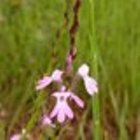
Two new varieties of hybrid maize that are resistant to the parasitic Striga weed  and mature between 20 and 50 days earlier than current varieties have been developed by a Kenyan scientist. Professor Mathews Dida, a maize breeder at the School of Agriculture and Food Security at Maseno University in Kenya, developed the maize varietie Maseno EH10, EH11 and EH14s that produce a natural chemical that suppresses the growth of Striga , also known as witch-weed.
and mature between 20 and 50 days earlier than current varieties have been developed by a Kenyan scientist. Professor Mathews Dida, a maize breeder at the School of Agriculture and Food Security at Maseno University in Kenya, developed the maize varietie Maseno EH10, EH11 and EH14s that produce a natural chemical that suppresses the growth of Striga , also known as witch-weed.
The colourfully-flowered weed affects cereal crops in many parts of Africa and is a major cause of crop failure in East Africa, where climate change has been driving its spread in recent years. Striga infestations destroy crops estimated to be worth US$10-38 million per year in Kenya alone.
The varieties are undergoing Distinctness, Uniformity and Stability tests by the Kenya Plant Health Inspectorate Services (KEPHIS) and will be available for commercial production by the end of 2014.
 Prof Dida says the new varieties will contribute to food security and poverty alleviation in Kenya and the entire East Africa region. "These hybrids passed national performance trials conducted between 2009 and 2011. All requisite assessment by KEPHIS, which ascertains effectiveness of newly developed seeds, points to their success. They flower in 60 days and mature in 80 days. This represents a reduction from 125 to 80 days," he says, adding that the varieties yield between nine and twelve tonnes per hectare.
Prof Dida says the new varieties will contribute to food security and poverty alleviation in Kenya and the entire East Africa region. "These hybrids passed national performance trials conducted between 2009 and 2011. All requisite assessment by KEPHIS, which ascertains effectiveness of newly developed seeds, points to their success. They flower in 60 days and mature in 80 days. This represents a reduction from 125 to 80 days," he says, adding that the varieties yield between nine and twelve tonnes per hectare.
Although the varieties could potentially thrive in almost all parts of Kenya, they were developed for mid-elevation areas and the lowlands - such as the Lake Victoria region and coastal region which receive relatively scarce rainfall.
Dr Dan Makumbi, a maize breeder at the Kenya regional office of the International Maize and Wheat Improvement Center, notes that the new varieties will give farmers maize that is resistant to the devastating weed, is higher yielding and also attractive to those in the seed business.
This article is adapted from a piece by George Achia published on SciDev.Net on 29th May 2013; and a piece by Justus Wanga published in the 'Daily Nation' newspaper in Kenya.